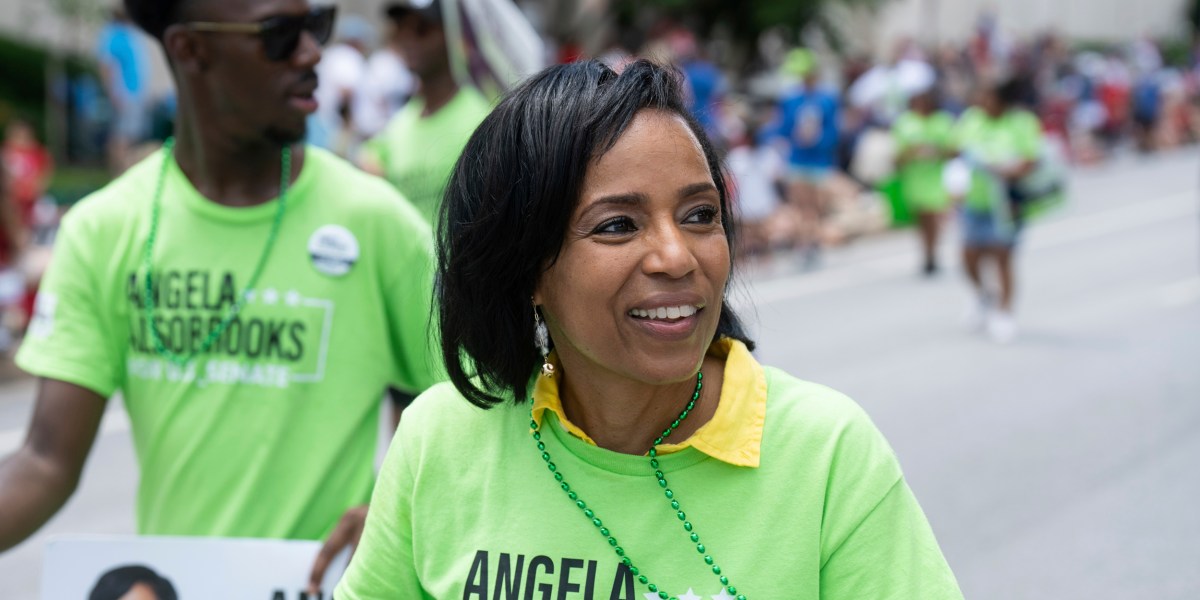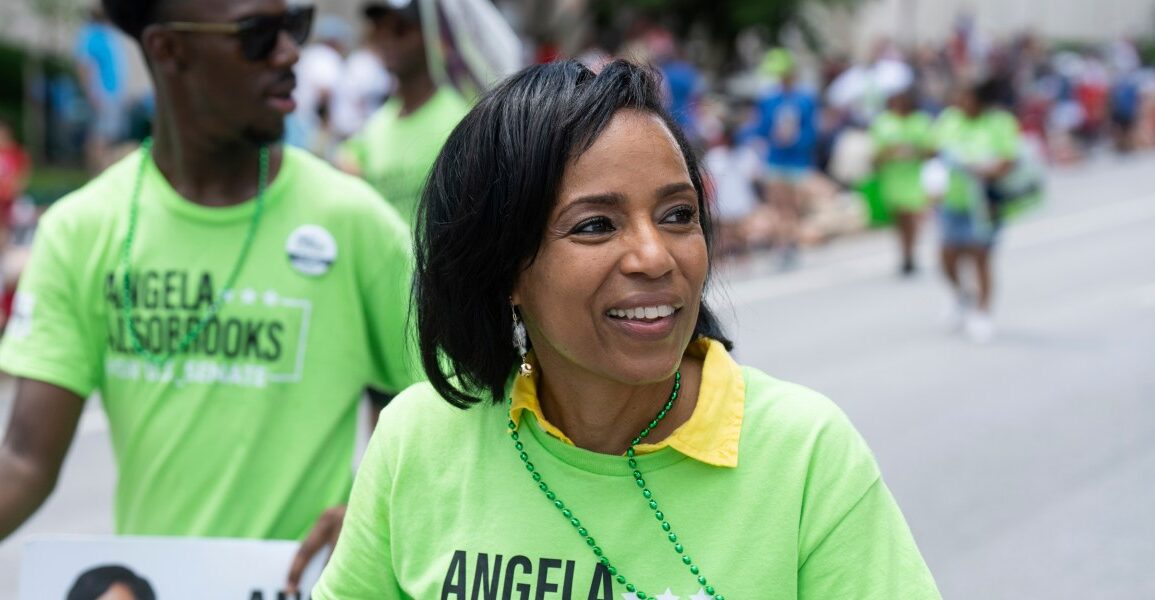
Eight months before Maryland voters will cast their ballots in a rare U.S. Senate primary, the bulk of the state’s Democratic machine has already consolidated behind one candidate. Prince George’s County Executive Angela Alsobrooks emerged as a front-runner shortly after announcing her candidacy, garnering endorsements from major Democratic officials and organizations before her campaign had any issue platforms listed on its website.
The race presents a unique opportunity to fill a safely blue seat with a new candidate for the first time in 16 years. If Alsobrooks is successful, she would become Maryland’s first Black senator. While Democrats have embraced Alsobrooks’s historic campaign with enthusiasm, however, her record on criminal justice has largely gone overlooked.
During past campaigns for Prince George’s state’s attorney, Alsobrooks positioned herself as staunchly “tough-on-crime.” In addition to pushing the notion that cannabis decriminalization led to drug dealers murdering each other, she has supported DNA collection of people without criminal convictions, putting police in schools, and harsh penalties in a variety of situations, among other positions opposed by justice system reformers.
Now, however, in her bid for Senate, she’s refashioning herself as one of the reformers — despite continuing to support some of the same punitive policies she championed as her county’s top prosecutor.
When Alsobrooks ran for state’s attorney, people were hungry for tough-on-crime policies, said Qiana Johnson, a local criminal justice reform advocate, who wants Alsobrooks to be open about how those policies failed.
“Angela Alsobrooks should embrace being a prosecutor and engaging in those tough-on-crime theories, because she can attest to the fact that she was there and endorsed it when it didn’t work,” said Johnson. “It’s OK to say that, but to pretend as if she’s always been a reformer — that’s clearly not the case.”
“Angela Alsobrooks should embrace being a prosecutor and engaging in those tough-on-crime theories, because she can attest to the fact that she was there and endorsed it when it didn’t work.”
Alsobrooks is widely considered a leader in the race. She has received endorsements from much of Maryland’s Democratic establishment, including Sen. Chris Van Hollen, former House Majority Leader Steny Hoyer, and a host of other national and state-level politicians, as well as a raft of powerful Democratic-aligned political action groups. The race is to fill the seat of Sen. Ben Cardin, who announced in May that he would not seek reelection after three terms in office. (He has not made any endorsements in the race, and his spokesperson Sue Walitsky told The Intercept he currently has no plans to endorse in the May 2024 primary.)
Alsobrooks served as state’s attorney from 2011 to 2018. In that time, she emphasized severe punishments, including seeking the death penalty in the years before Maryland outlawed it and supporting the increase of mandatory minimum sentences for people convicted of illegal gun possession. Her tough-on-crime views also included the claim that cannabis decriminalization was linked to murders in her county.
“The decriminalization of marijuana has really driven the violence we have seen this year in Prince George’s,” Alsobrooks said in a 2015 interview with NPR. “What we’re seeing is they’re fighting for turf. The marijuana dealers are fighting.”
Campaign spokesperson Gina Ford said in a statement to The Intercept that Alsobrooks made the remarks after county police officials claimed the state’s 2014 law decriminalizing cannabis had contributed to a homicide spike. Existing research, however, has not supported similar claims.
“Angela’s focus has always been on keeping our communities safe from violence, not prosecuting adults possessing marijuana for personal use,” wrote Ford. “Her comments then and her belief today is that violent criminals should be aggressively targeted by law enforcement and prosecuted to the fullest extent of the law.”
DNA Collection Without Convictions
As state’s attorney, Alsobrooks supported collecting DNA information from people who had been arrested but not convicted of a crime. In 2012, she said she hoped the Maryland Supreme Court would reconsider a decision that declared such practices unconstitutional.
Civil liberties advocates have long warned about the pitfalls of using biometric data, including technological flaws that could lead to racial bias and the erosion of constitutional rights. Among the concerns are the authorities having a universal DNA database. While DNA collection by police began as a targeted program for only people with certain convictions, wider dragnets like those pursued by Alsobrooks have led to a ballooning of DNA samples held by the authorities; the FBI-maintained national database now holds more than 21 million DNA profiles.
More than a decade after her initial DNA push, Alsobrooks’s approach to the issue appears to be unchanged. In February, when Maryland lawmakers considered enhancing privacy restrictions in the collection of biometric data, Alsobrooks testified in opposition. Alongside the Prince George’s County Police Department, Maryland Chiefs of Police Association and the Maryland Sheriffs’ Association, and the Maryland Sheriffs’ Association, she argued that a bill regulating private use of biometric data would hinder law enforcement’s ability to solve crimes.
Asked if Alsobrooks would support the collection of biometric data by police if elected senator, Ford said she is “focused on protecting Marylanders from violent crime and searches consistent with our 4th amendment rights are a critical tool in keeping Marylanders safe.” Asked if Alsobrooks still supports collecting DNA from people not convicted of a crime, Ford said that “collecting records like fingerprints and DNA swabs is a valuable tool in catching and prosecuting violent criminals involving cold cases related to rapes and murders.”
Alsobrooks also opposed removing school resource officers in Prince George’s County Public Schools, even though the presence of such officers has been shown to exacerbate the school-to-prison pipeline and lead to harsher punishments for kids. While she embraced a rehabilitative approach for juveniles in the criminal justice system, including smaller, localized alternatives to traditional juvenile detention centers, she emphasized harsh sentences for kids who committed violent crimes. “I support the rehabilitation focused approach to juvenile justice,” Alsobrooks’s 2010 campaign website said. “However, violent offenders of any sort will be punished.”
Ford said it was not true that Alsobrooks pushed for harsh sentences for juveniles but would not say if she supports charging juveniles as adults. “Angela has always been focused on protecting Marylanders from violent crimes and believes these decisions shouldn’t be made lightly or often but should be considered on a case-by-case basis depending on the facts,” she said.
Ford pointed to Alsobrooks’s work on police reform, including establishing a police reform working group in the summer of 2020 and hiring a reform-minded police chief. She noted that Alsobrooks started other programs to give first-time, nonviolent offenders a second chance and to ease reentry for formerly incarcerated people.
In June, Alsobrooks vetoed $250,000 in funding for a program that would have provided social services, mental health support, education, and job training to young offenders while they’re still in jail to prevent recidivism. The program was proposed by Prince George’s County Council Member Edward Burroughs, who previously coordinated juvenile diversion programs at the state’s attorney’s office and served on the county school board. Burroughs said Alsobrooks issued her first veto against funding the program because he isn’t supporting her Senate campaign.
“She vetoed it because I was not supporting her for the Senate,” Burroughs said. “And I think that’s unconscionable to have a political decision made on something that is so important.” Ford said the claim was “absurd.” She said Alsobrooks had allocated millions toward youth and reentry programs and vetoed the amendment because it would have taken money from county workers’ pension funds.
Burroughs said he shared the excitement of having a Black woman running for the Senate but that Alsobrooks’s record is disqualifying.
“It’s an amazing goal of so many elected officials in Maryland to elect a woman, a Black woman, to the Senate,” he said. “When you examine her record as state’s attorney and county executive closely, it is clear that in so many areas there are significant, significant concerns that show a pattern of a disregard for working people and families, that show a disregard for meaningful juvenile justice reform and uplifting young people in a tangible way.”
“We know that no matter who we put into that office, we’re going to have to hold them accountable.”
The rush to get behind Alsobrooks’s campaign because of its historic nature speaks to a broader failure to adequately scrutinize her record, said Johnson, the local reform advocate, who heads Life After Release, an organization led by formerly incarcerated women and founded the accountability group Courtwatch PG.
“That’s the unfortunate thing for most voters where we are. We rush to back a candidate that looks like us, sounds like us, and is aesthetically pleasing,” she said. “We know that no matter who we put into that office, we’re going to have to hold them accountable.”
This post was originally published on this site be sure to check out more of their content.







